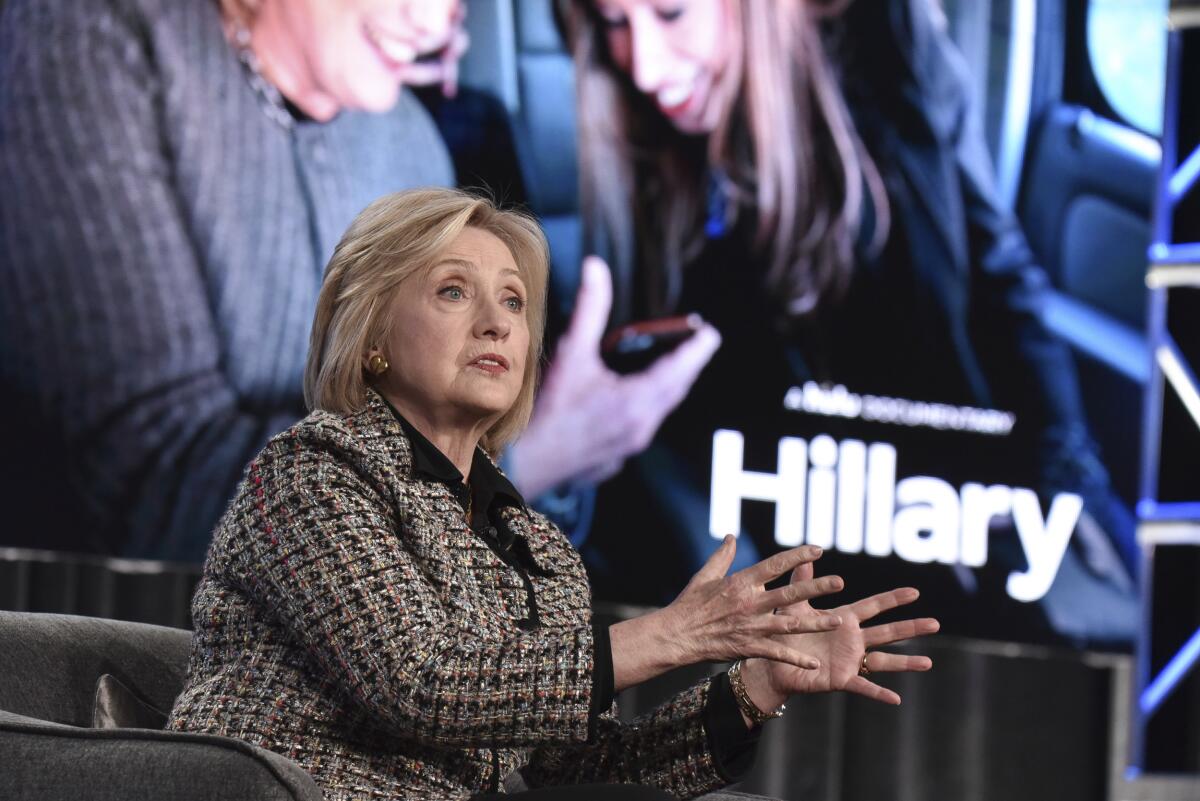‘Nothing was off-limits’: Hillary Clinton discusses life-spanning new docuseries

- Share via
Hillary Clinton will be the first to say that Hulu’s four-part documentary series chronicling her life and 2016 presidential campaign did not start out as the project it ended up being.
“Hillary,” which makes its Sundance premiere next week, features interviews with Clinton, as well as her husband and former president, Bill Clinton, daughter Chelsea Clinton, staff, friends and journalists to offer a portrait of the former secretary of State’s life in the public eye as one of the most lauded and vilified figures in American politics. Viewers can stream it March 6 on Hulu.
The former secretary of State was joined Friday by director Nanette Burstein to discuss the documentary during Hulu’s round of presentations at the Television Critics Assn. press tour in Pasadena.
“It really started out as maybe a campaign documentary, because we had about 1,700 hours of behind the scenes footage,” said Clinton, who noted “nothing was off-limits.” “But Nanette, who I was very impressed with when we interviewed her as the person who was going to direct the film, came back and was like, ‘Look, this is a bigger story. It needs to be told. It’s part of the arc of women’s history and advancement.’ ... So I’m not running for anything, I’m not in office, so I said sure why don’t we give it a try. So off we went.”
Here’s a rundown of what Clinton had to say during the panel:
On women and likability — will we ever get past it?
I sure hope so, because it’s really an unfair double standard [and] disadvantage. I am certainly in the camp that believes that the more women who get out there, whether it’s politics, entertainment, journalism or anything else, the more we should realize that women have the same right to have a full range of emotions and approaches to how they make decisions, so that we can begin to put [likability] on a shelf and leave it there.
On being a polarizing figure:
I became a kind of Rorschach test for women and women’s roles as soon as I burst onto the public scene when Bill was running for president. You know, I lived more than 40 years before and I had no real understanding what it meant to be thrust into the highest, brightest platform and try to live your life and try to go along with what you’ve always done. For example, when Bill asked me to lead our efforts on universal health care, it seemed pretty standard to me because I had done similar things in Arkansas in education. Little did I know that it would create the most extraordinary backlash that the first lady would be involved in trying to make sure everybody has quality, affordable health care in our country. ... Part of it was the timing that I came on national scene, what I chose to do, which was extremely controversial, the fact that I was the first first lady of my generation and had been working ever since I was a young woman.
On what she hopes American voters take away from the documentary:
By the time this runs, it will be right in the thick of Super Tuesday, so we’ll have the first four contests behind [us]. So maybe by that time the field will have clarified and we’ll have a better idea of who will likely end up with enough delegates to be the nominee. I think the most important message is we are — and I say ‘we,’ that’s the side I’m on, I am on the side of an inclusive, generous, open-hearted country that faces up to the future and tries to bring people together — we’re in a real struggle with a form of politics that is incredibly negative, exclusive, mean-spirited, and it’s going to be up to every voter — not only people who vote in Democratic primaries — to recognize this is no ordinary time.
This is an election that will have such profound impact. Take your vote seriously. And for the Democratic voters, try to vote for the person you think is more likely to win. Because at the end of the day, that is what will matter. And not just the popular vote, but the Electoral College [laughs]. So I want people to take their vote really, really seriously because Lord knows what will happen if we don’t retire the current incumbent.
On what people can do to create change:
I don’t mean to be overly simplistic or put on my rose-colored glasses. (1) Vote. Please vote. It is almost a truism to say that we can look at what’s happening politically in our country right now and be so discouraged, so frustrated, even disgusted, that it just turns you off. Why in any way participate or contribute to that absolute craziness? It doesn’t have to be that way. It wasn’t so long ago when we had a president where we didn’t have to worry every morning when we woke up about what was going to happen that day or what crazy tweet would threaten war ... so there is no substitute for voting. Second thing, [with] media. ... We’ve got to somehow understand that you can’t make good decisions in a democracy if we can’t even agree on the basic facts. ... The final thing is: We’ve got to figure out how to have a more constructive relationship with social media. I am worried because everything I just said about what can hamper in the political realm is amplified in the realm of social media.
More to Read
The complete guide to home viewing
Get Screen Gab for everything about the TV shows and streaming movies everyone’s talking about.
You may occasionally receive promotional content from the Los Angeles Times.







